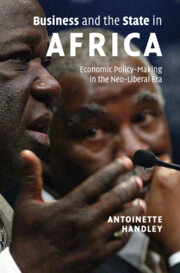Book contents
- Frontmatter
- Contents
- List of figures
- Acknowledgments
- List of abbreviations
- Introduction: the African business class and development
- Part one Institutionalizing constructive contestation
- 1 Ethnicity, race, and the development of the South African business class, 1870–1989
- 2 The neo-liberal era in South Africa: negotiating capitalist development
- 3 Business and government in Mauritius: public hostility, private pragmatism
- Part two Business and the neo-patrimonial state
- Conclusion: the business of economic policy-making, comparatively speaking
- Bibliography
- Index
1 - Ethnicity, race, and the development of the South African business class, 1870–1989
Published online by Cambridge University Press: 22 September 2009
- Frontmatter
- Contents
- List of figures
- Acknowledgments
- List of abbreviations
- Introduction: the African business class and development
- Part one Institutionalizing constructive contestation
- 1 Ethnicity, race, and the development of the South African business class, 1870–1989
- 2 The neo-liberal era in South Africa: negotiating capitalist development
- 3 Business and government in Mauritius: public hostility, private pragmatism
- Part two Business and the neo-patrimonial state
- Conclusion: the business of economic policy-making, comparatively speaking
- Bibliography
- Index
Summary
It was not capitalism per se which was the enemy of the Afrikaner people … but the control of the system by non-Afrikaners.
Thomas Koelble argues that South Africa's “nationless state has produced two competing versions of modernity, one based on the precepts of the liberal ethos of universal human and individual rights, individual entitlement and autonomous citizenship. The other version of modernity is based on the assertion of group rights and ethnic solidarity.” Neither one of these two versions has been exclusively associated with any one ethnic or racial group – or indeed any one class – in South Africa. Rather, these competing versions have waxed and waned, been taken up and discarded, by a number of groups in response to broader political developments. While the policy needs of mining magnates dominated policy-making in the early twentieth century, political and economic power were divided on an explicitly ethnicized basis from the 1930s with the rise of a brand of Afrikaner nationalism that was hostile to the English-speaking mining magnates. The coincidence of ethnic identifications and economic strata has, however, been enormously consequential.
Throughout the modern history of South Africa, English-speakers were advantaged by their association with British capital; they were the most skilled, educated, and urbanized group from the outset and this gave them a head start, economically speaking.
- Type
- Chapter
- Information
- Business and the State in AfricaEconomic Policy-Making in the Neo-Liberal Era, pp. 29 - 61Publisher: Cambridge University PressPrint publication year: 2008

